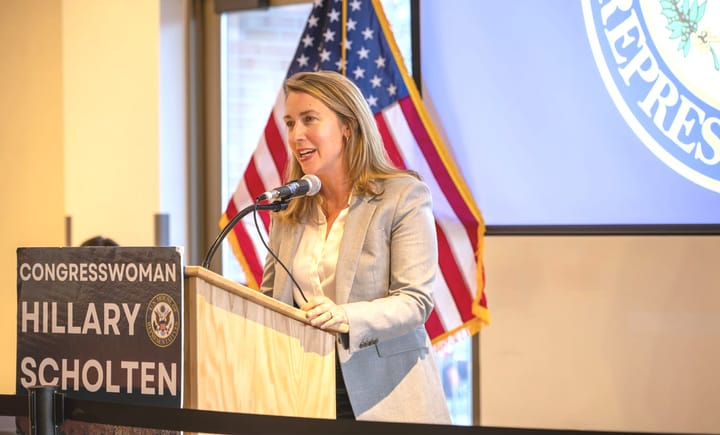Sixth lawsuit filed against Ottawa County Board of Commissioners under Ottawa Impact leadership
On Oct. 30, Adrea Hill and Luke Sanner sued in Ottawa County’s 20th Circuit Court claiming Freedom of Information Act requests they filed respectively were not fulfilled adequately by the county.

OTTAWA COUNTY — Ottawa County is now facing a sixth lawsuit since far-right fundamentalist Ottawa Impact took control of the local board or commissioners in January 2023 — this time over allegations that public records requests have not been handled properly.
On Oct. 30, plaintiffs Adrea Hill and Luke Sanner filed a complaint in Ottawa County’s 20th Circuit Court claiming Freedom of Information Act requests they filed respectively were not fulfilled adequately to what state law requires.
“Defendant has violated FOIA by refusing to produce communications that it is required to produce to Plaintiffs pursuant to FOIA for a reasonable fee and within the time required under statute,” Hill and Sanner said through their attorney, Sarah Riley-Howard.

Hill/Sanner lawsuit206KB ∙ PDF fileDownloadRead the complaint alleging Freedom of Information Act violations by Ottawa County.Download
Both the county and the Ottawa County Board of Commissioners are named in the lawsuit.
In May 2024, Hill filed a request for "text messages and emails related to county business sent or received by Lynn Janson on Thursday, May 2, from noon until 5 p.m."
The request came after the county’s Officers’ Compensation Commission, comprised of citizens appointed by the board of commissioners, voted 3-1 on April 11 to give raises to county commissioners beginning in 2025.
The raises were controversial because the compensation commission, of which Janson is a member, staged a “re-enactment” of an April meeting on May 23 after the earlier meeting was not properly noticed in compliance with Michigan’s Open Meetings Act.
At the re-enactment, the compensation commission voted 5-0 to re-approve two measures that would give raises to countywide elected offices and road commissioners, however, the action occurred outside of the compensation commission’s 45-day window to make recommendations to the county commission for raises.
The validity of whether or not the redo was legal, however, is in doubt. In emails Jackson sent to Anderson and the commission members, he said Thursday’s meeting was outside of the commission’s 45-day window to operate.

The May 23 meeting stalled for nearly 20 minutes and Janson announced that the county’s corporation counsel was on its way to the meeting room at the Fillmore Complex, despite Janson not leaving the room, nor taking any calls prior to the statement.
The Hill FOIA request
Hill’s request seemingly is predicated on the possibility that Janson could have texted county staff, including corporation counsel, in order to make his statement make sense.
Howard said county corporation counsel Jack Jordan responded to Hill's request with an estimated fee of $352.79 and claimed the request “would require a search of communications on the county server of all of its more than 1,000 employees.”
Hill protested the estimated fee, saying all that was required was searching communications related to county business sent or received by Janson.
In a July 9 response to Hill’s appeal, Jordan denied that the fees were inflated, but did not address Hill’s claim that Jordan “proposed an inflated and unnecessary search of all county employees to fulfill her FOIA request,” according to the complaint.
In a follow-up communication, corporation counsel refused to produce the records to Hill claiming it was outside of the county’s purview, as Janson isn’t an employee.
The county “did not address the fact that Lynn Janson is a member of the Ottawa County Compensation Commission, and as such, is a public official in that capacity and that his communications are subject to disclosure under FOIA,” Howard said.

Email exhibits1.47MB ∙ PDF fileDownloadRead the emails submitted to Ottawa County 20th Circuit Court as part of the lawsuit filed Oct. 30, 2024.Download
The compensation commission was formed in late 2005 and makes determinations for the compensation of county elected officials in even-numbered years.
State statute requires that compensation commissions must comply with Michigan’s Open Meetings Act. According to Michigan’s FOIA law, all “public records” are subject to possible disclosure unless specifically exempted by statute.
A “public record” is a writing that is prepared, owned, used, in the possession of, or retained by a public body in the performance of an official function, from the time it is created. Under this broad definition, emails, text messages, social media posts, and even voicemails could be subject to disclosure under FOIA if made in the furtherance of government business, according to case law cited by the Michigan Association of Counties.
“Specifically, Defendants have refused to require public officials to search all communication accounts and on all devices — public-owned and personally owned — for communications concerning matters of public business for lawfully required disclosure in response to Plaintiffs' FOIA request,” Howard said in Wednesday’s filing, asserting that the county’s position is not supported by Michigan law.
The Sanner FOIA request
Sanner filed a FOIA request on Nov. 5, 2023, asking for instant messaging communications between Ottawa Impact-aligned Ottawa County commissioners on Oct. 24 and Oct. 25 — dates that coincided with a failed termination hearing for the county’s administrative health officer.
Ottawa Impact is a far-right fundamentalist group created in 2021 by now board Chair Joe Moss after he took issue with pre-K-6 school mask mandates during the COVID-19 pandemic. The group currently controls six seats on the 11-member board of commissioners.
In his request, asked for “communications found on personal devices used for county-related business as well as county owned devices."
On Nov. 29, the county denied Sanner's request claiming personal devices weren’t under the county’s purview.
“Defendants took the position that such communications were not within the definition of ‘public record’ under FOIA,” Howard said.
On Dec. 6, Sanner appealed the denial of the records, however, he claims that the county never responded within 10 business days — which is what is required for the appeals process under Michigan law.
When Sanner didn’t receive a response, he followed up by email to the county on Feb. 14, and on May 2 asking about the status of his appeal.
May 3, the county responded to Sanner denying his appeal, claiming they responded to his appeal in a timely manner on Dec. 21, but erroneously sent the response to an incorrect email address.
Howard said both examples show that the county isn’t following appropriate processes and procedures to ensure public record access exists for residents.
Hill and Sanner are seeking:
- A declaration that Ottawa County violated Michigan’s FOIA law.
- A court-ordered injunction requiring the county to produce the requested documents for Hill’s and Sanner’s respective requests within 14 days.
- Reasonable attorney's fees.
- A complete accounting under oath by a corporate witness as to whether any responsive documents have potentially and/or likely been destroyed.
Howard has been a prominent figure in litigation against the county over the past two years. Most notably, Howard represented Administrative Health Officer Adeline Hambley during her yearlong wrongful termination lawsuit. In February, Hambley settled with the county with her remaining in her role.
Although Hambley didn’t receive any additional compensation, the settlement agreement allowed a judge to determine if Hambley’s legal fees would be covered. In August, the judge in the case concluded the county must pay more than $188,000 for Hambley’s legal fees.
Howard also is representing Rev. Jared Cramer, a Grand Haven pastor suing the county board of commissioners , claiming Board Chair Joe Moss used his position to not grant Cramer’s request to provide an invocation for a commissioners meeting last year.
Cramer’s lawsuit claims that Moss endorsed “a particular set of religious beliefs and exclude a particular set of religious beliefs" and therefore "is discriminating against certain religious beliefs," which is a violation of the Establishment Clause of the First Amendment.
On Oct. 28, U.S. Magistrate Sally J. Berens issued a written order indicating that Cramer and the county have reached a tentative settlement agreement, the details of which have not been made public.
The court has “been informed of the parties' agreement to settle this matter in principle subject to board approval,” Berens said in the order, meaning a majority of the OI-controlled board of commissioners must approve the settlement agreement for it to be legally binding.
In July, U.S. District Court Judge Jane M. Beckering ruled that the county’s request to dismiss the case didn’t negate the fact that Cramer experienced potential discrimination.
“The harm alleged by Rev. Cramer is anchored not in future events but in disputed interpretations of past events,” Beckering wrote in the opinion published Tuesday. “His pleading sufficiently alleges a concrete factual context from which his claims arise. The court further determines that judicial resolution of the claims would be desirable under all of the circumstances.”
Just last week, the county lost another motion — this time to disqualify Howard from representing Cramer because she also is representing Commissioner Chris Kleinjans in a lawsuit against Michigan State University’s Extension Office, which has been amended to include Moss as an individual defendant.
In her ruling denying the disqualification request, Beckering said there was no evidence of a direct conflict.
“While Attorney Howard is acting as an advocate in Rev. Cramer’s case against the Commission, of which Kleinjans is now a member, Attorney Howard is not suing Kleinjans in his individual capacity; rather, Rev. Cramer’s suit challenges the propriety of the decision of the political body,” Beckering wrote in her order dated Wednesday, Oct. 23.
Kleinjans, who joined the commission on May 23 after winning a May 7 special recall election this year, filed his own lawsuit June 21 in the U.S. Western District Court claiming Extension violated his First Amendment Rights after giving him an ultimatum after he was elected: Take an unpaid leave through the remainder of the year or face termination.
Moss was added as a defendant in the Kleinjans case on Aug. 20, just days after M. Scott Korpak, the new District 7 director, confirmed that during a Dec. 7 meeting with then-interim director James Kelly, Moss and Ottawa Impact Commissioner Allison Miedema, the commissioners “threatened” the annual memorandum of understanding between the Extension and the county.
Howard said Kleinjans was not on the commission during the relevant time period when the substantial facts of Cramer’s case occurred.
Beckering seemed to agree with Howard’s argument in her recent ruling.
“The employment case that Attorney Howard is pursuing on Commissioner Kleinjans’ behalf is brought in his individual capacity. Hence, Reverend Cramer’s and Commissioner Kleinjans’ interests are not “directly” adverse,” Beckering wrote in her Oct. 23 order.
The next step in the Cramer case would be for the full board of commissioners to vote on the proposed settlement, most likely in closed session at the next meeting scheduled for 9 a.m. Tuesday, Nov. 12.
If the deal is approved by the board, it would be the fourth of six current lawsuits filed against the Ottawa County Board of Commissioners since the OI majority was sworn into office in January 2023.
After the Hambley lawsuit was settled, a wrongful termination lawsuit was settled in September this year.
In October 2023, a finalist for an executive aide position, sued in Ottawa County's 20th Circuit Court, claiming then-administrator John Gibbs committed age discrimination when he hired a younger candidate with fewer qualifications than the county required.
Ryan Kimball settled with the county in September this year, with the county agreeing to pay $150,000 to Kimball and $75,000 to his attorneys.
Also in September, the Michigan Supreme Court declined to weigh in on a lawsuit filed in March 2023 alleging that the incoming OI commissioners violated the state's Open Meetings Act in the months after being elected, but before taking office.
The Michigan Court of Appeals unanimously ruled Jan. 26 that Muskegon County 14th Circuit Court Judge Matthew R. Kacel didn't make a legal error when he dismissed the lawsuit. With the state high court refusing to take up the case, it ended the litigation.
With the addition of the Hill/Sanner lawsuit, one other lawsuit remains active against the full board, which was filed by Gibbs in April this year after he was fired Feb. 29.
Sentinel Leach is a reader-supported publication. To receive new posts and support my work, consider becoming a free or paid subscriber.
Moss motioned to terminate Gibbs for cause during a public meeting — largely focused on allegations Moss publicly published on social media from Gibbs’ staff.
In federal court, Gibbs claimed the board retaliated against him, violated his First Amendment rights and that Moss defamed him on social media that “lack factual support” and that Moss “knew that the defamatory statements were false.”
There currently are no scheduled proceedings in the Kleinjans case, with proposed case schedules due to the court by Nov. 11. There currently are no scheduled proceedings in the Gibbs case.
— Contact Sarah Leach at SentinelLeach@gmail.com. Follow her on Twitter @SentinelLeach. Subscribe to her content at sentinelleach.substack.com.



